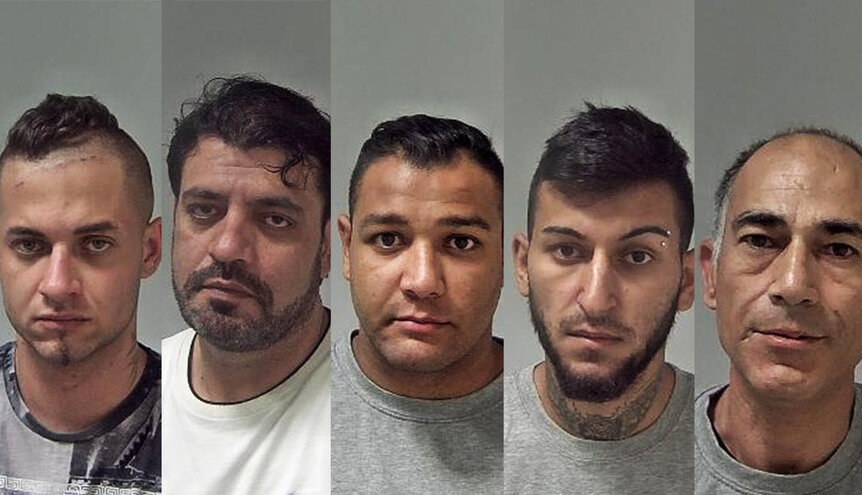Create a free profile to get unlimited access to exclusive videos, breaking news, sweepstakes, and more!
Father Convicted For ‘Horrific’ Acid Attack On His 3-Year-Old Son In Deranged Custody Plot
A 40-year-old British father was slapped with a 16-year prison sentence for enlisting the help of five other men to spray his toddler son with sulphuric acid.
A U.K. father has been sentenced to 16 years in prison for orchestrating a plot to douse his 3-year-old son in sulphuric acid.
The 40-year-old man, who British authorities haven’t named, was convicted on March 6 of conspiracy with intent to “burn, maim or disfigure” his son after he hired five men to spray the toddler with acid at a Worcester discount department store last July.
The attack was a coordinated effort to smear the man's wife as a negligent, deadbeat mother in order to gain the upper-hand in a custody battle over the child, according to documents obtained by Oxygen.com.
The father, including his co-conspirators, Adam Cech, 27, Jabar Paktia, 41, Jan Dudi, 25, Norbert Pulko, 22 and Saied Hussini, 41 have been sentenced to a combined total of 78 years in prison for the monstrous act.
Another woman, Martina Badiova, 22, of Birmingham, was also charged but ultimately acquitted of conspiracy charges in the crime.
On July 21 last year, CCTV surveillance captured Cech, Dudi, and Pulko at the store where the attack occurred. The footage shows Cech calmly approaching the 3-year-old, who was looking at a bin of soccer balls with his older brother, while their mother shopped nearby. Using a tiny bottle, Cech discreetly sprayed the little boy with acid as he walked by. As the corrosive fluid began to eat away at the screaming toddler's flesh, Cech nonchalantly strolled down another aisle. The entire attack lasted a fraction of a second.
The child, who was treated by paramedics shortly after, survived but suffered burns and scars to his face and arms.
"Red marks then started to develop like a snake up his arm," said the boy’s mother, who hasn't been named, in a victim statement.
Hours later, the father even praised his co-conspirators, texting a meme with the phrase, “Nailed it!” to one of them, according to police.
"This was a horrific attack on an innocent young boy, whose scars will prove a constant reminder of that awful day,” Merica Police Superintendent Damian Pettit said in a press release.
"For a three-year-old boy to be the victim of such an attack is inconceivable. It is hard for the family, the officers, and the community to comprehend how a family member could organize an attack of this nature on such a young child,” he added.
The boy's mother had no idea her children were being stalked by a group of men while she shopped.
"It shocks me to think that people could be involved with doing this to a defenseless child,” she said. “It has been extremely hard to accept ... that his father was behind this. How could he pay for someone to attack our child with acid? How will I explain this to my son?"
For weeks after the attack, she admitted she couldn't sleep.
“I have repeat nightmares about what happened that day,” she added. "I hope nobody ever has to go through what we have experienced."
Indeed, acid attacks are vicious and incredibly traumatizing crimes that not only scar victims physically, but also psychologically.
“It is the cruelest form of violence against any person,” Mangai Natarajan, a criminologist at the John Jay College of Criminal Justice in New York, told Oxygen.com. “You are taking away the flesh of a person.”
Natarajan pointed out that Britain could do more to regulate sulphuric acid and other corrosive liquids. For example, Bangladesh, saw a drastic decline in acid attacks once it introduced regulatory measures, she said.
“[Acid attacks are] an extreme form of violence, using an extreme weapon, and it’s designed to disfigure and disable the victim for life,” said Danielle Spencer, a policy adviser at the British branch ActionAid International, an NGO that works with acid attack survivors around the world and advocates for stronger laws against acid-throwing.
Police specified that acid attacks aren’t common in Worcester, a city of roughly half a million people in central England, about 130 miles north of London. However, Britain has one of the highest rates of acid attacks in the world, according to Acid Survivors Trust International, a London-based nonprofit that tracks global acid attacks. In 2016, acid was used in 454 crimes in London.
Spencer acknowledged that gang activity has caused a spike in acid attacks in the British capital.
“The rise [of acid attacks] in Britain has been attributed to gangs, predominantly in London, favoring acid as a weapon because it is more easily available and less regulated than knives and guns,” she added.
For this reason, she said, men tend to be the assailants—and the victims. In this regard, the U.K. is a bit of an outlier. Most acid crimes elsewhere are gender-motivated. In developing countries like India, Cambodia, Colombia, and Uganda, where acid-throwing is also prevalent, women are frequently the victims. Acid attacks are rare in Europe and North America, according to the World Health Organization.
Nonetheless, these attacks have the potential to “destroy lives,” particularly in countries where, “gender inequality is rampant.”
“Disfigurement becomes a public mark of shame,” Spencer added. “It makes it hard to get married or gain employment, and forces [women] to stay at home, and essentially drop out of society.”































